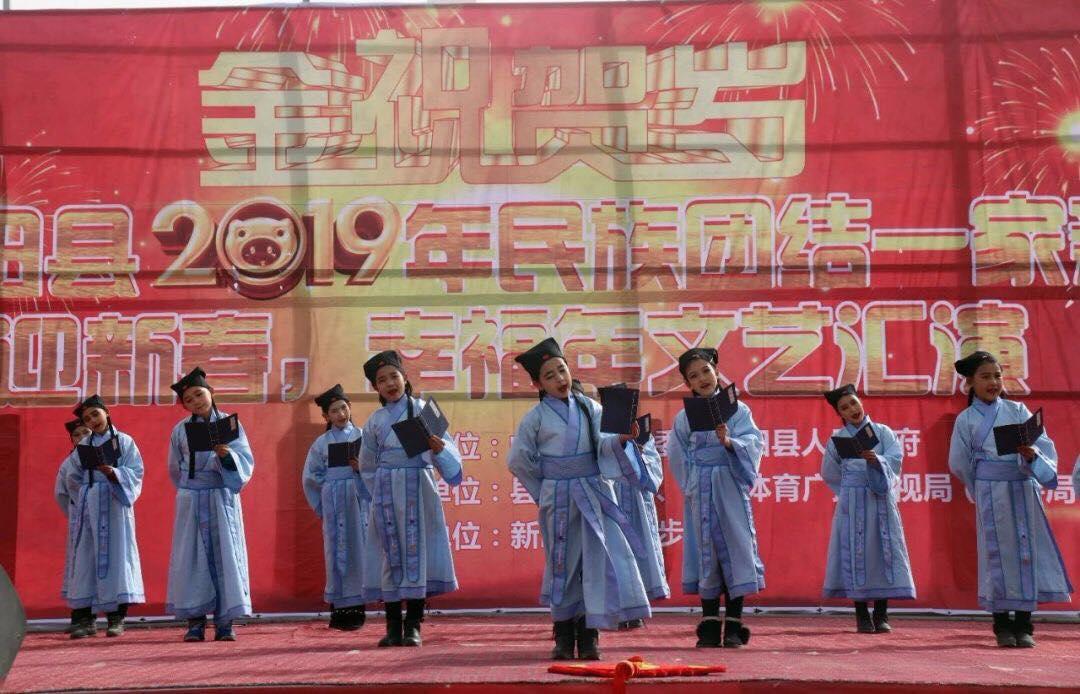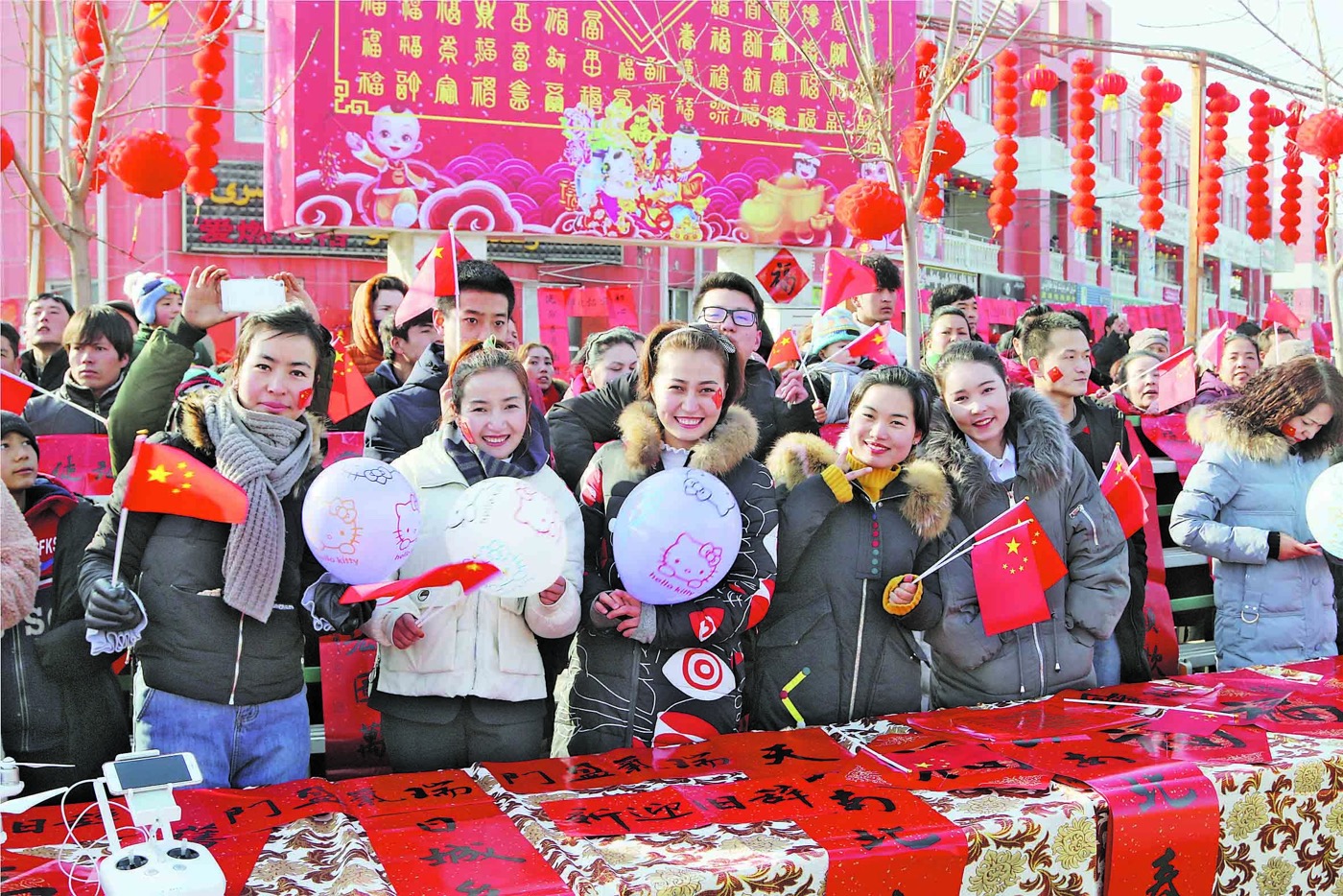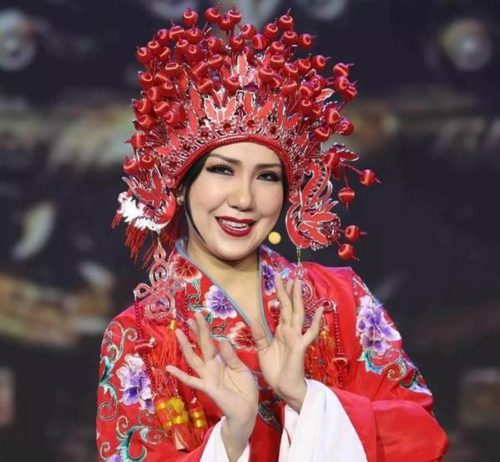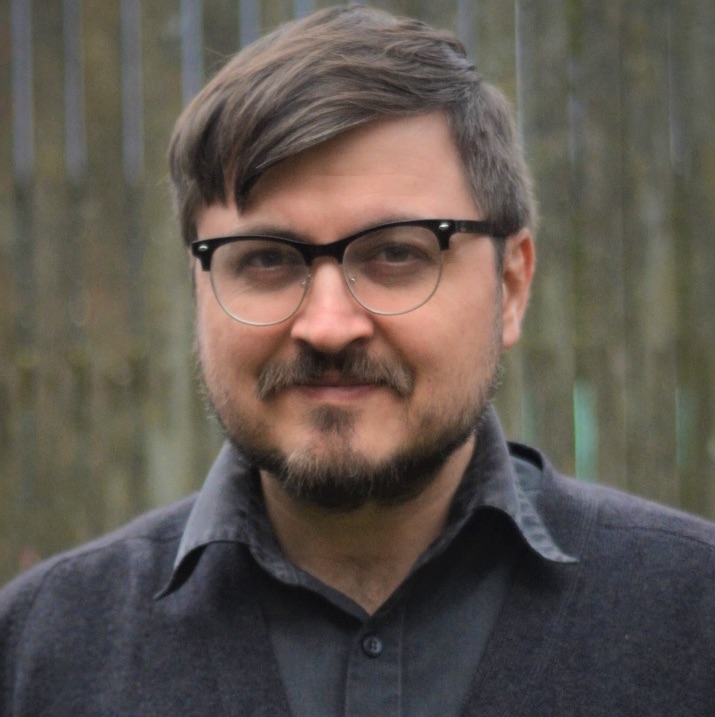The future of Uyghur cultural — and halal — life in the Year of the Pig
Up until 2018, Lunar New Year celebrations were conspicuously absent from Uyghur society. Today, it is the largest cultural event of the year — for the wrong reasons.

Top: Uyghur children dressed in Han cultural clothing celebrating the year of the pig in Hotan in 2019

The Chinese version of the lunar new year came early for Uyghurs in 2019. In mid-January, Uyghurs were asked to begin to write couplets describing their hopes and dreams for the year of the pig. They began practicing their lion and dragon dances. A Uyghur government official made a public display of dividing up pork and distributing it among villagers near the Muslim-majority town of Ghulja in celebration of the coming year. Many Uyghurs in the diaspora who I spoke with fear that the “pig” in the year of the pig will be all too literal: that this will be the year when Uyghurs in their homeland will be forced to eat pork as yet another way to perform Han-ness, along with being forced to shave off their mustaches.
In late 2018, numerous reports emerged from Uyghur Chinese Communist Party members calling on Uyghurs to eat non-halal food. One personal testimony written by a Uyghur official named Shireli Behit noted that Uyghur officials who refused to eat non-halal food were “two-faced” people who were influenced by the “three evil forces” of “religious extremism, ethnic separatism and violent terrorism.” Another Uyghur official wrote a public letter to his daughter apologizing for teaching her not to eat pork. He noted that in the past he had told her that if she ate pork she would “grow pig ears and a pig nose.” Now he wrote, “I feel a great deal of remorse, I was not mature enough in my parenting style.” Another Uyghur official wrote that “changing one’s eating habits has significant and far-reaching effects when it comes to ‘de-extremification.’”
The sense of revulsion that Uyghurs feel toward pigs, the avatar of the coming year, cannot be overstated. When I lived in Ürümchi in 2011 and 2014, many Uyghurs told me stories of close encounters with pork, the way the smell of it induced vomiting and the sight of it nausea. Halal food is a deeply-rooted aspect of Uyghur native life. It exceeds the bounds of simply religious piety. As a young, secular, college-educated woman who I will call Tumaris told me, “Even secular Uyghur families do not eat pork, it is about basic respect in the Uyghur community.” Continuing, she said, “The spiritual harm that comes from eating pork is way deeper than you can ever imagine, for Uyghur elders (eating it) is a way of disavowing our basic way of life.”
The prohibition on pork symbolizes something basic to Uyghur identity: it is a last element of native sovereignty. As with Spanish inquisitors and Jewish conversos to Christian cultural traditions in the 14th century, Han “re-educators” forcing Uyghurs to eat pork is a sign of ultimate submission to Han-ness. “It is hard to explain, but we feel that (not eating pork) is one of the essential criteria of being Uyghur,” Tumaris said. “Now, they say, ‘You cannot speak your language, you cannot practice your culture, you must show your loyalty’; making us eat pork is another level of pushing us down, violating our basic dignity.”
Many elderly Uyghurs have told me that one of the most psychologically damaging aspects of the Cultural Revolution was the way the Chinese Communist Party used pigs. Tumaris said, “They asked many Uyghur families, including my grandpa, to take care of pigs, to sleep in the same pen as the pigs. They made them refer to pigs as ‘political animals’ (Uy: siyasi haywan) that would teach them how to be ‘red.’ When I was a kid, many people told me stories of Uyghurs being forced to eat pork during those years, and subsequently how they went crazy.” Now, it appears as though history is repeating itself. In October 2018, images of a Uyghur farmer raising pigs as part of a state-mandated poverty alleviation project circulated widely in the Uyghur community. Tumaris and many other Uyghurs I spoke with fear that 2019 will bring even more of this symbolic violence.
This fear is fed by the way Uyghurs are being forced to celebrate the arrival of the new year. Up until 2018, celebrating the lunar new year was a conspicuous absence in Uyghur society. Now, for the first time in Uyghur history, it has become the largest cultural event of the year, replacing the monumental sacred holidays of Uyghur traditional life, Eid al-Adha and Eid al-Fitr, and the traditional Uyghur spring festival Nawruz, which are all now forbidden as signs of “religious extremism.”
The canceling of Uyghur sacred holidays, like forced pork consumption, has a historical precedent. During the height of the Maoist era in the 1950s and 1960s, all Uyghur traditions associated with Islam were labeled counter-revolutionary. But at that time, all traditional holidays, both Han and Uyghur, were canceled. Celebrating Han cultural traditions such as the lunar new year was also associated with the Four Olds: old ideas, old culture, old customs, and old habits. Instead, people were directed to celebrate events associated with the founding of the socialist nation. They attended dance performances of the eight model revolutionary operas chosen by Jiang Qing, the wife of Chairman Mao Zedong.
Uyghurs, too, celebrated these operas. They carefully translated the lyrics into Uyghur and performed them to the classical Sufi Islamic melodies of Uyghur muqam. At the time, the state believed that Uyghur cultural traditions could also become socialist traditions. This appears to no longer be the case. The transformation of Uyghur society now centers on the replacement of Uyghur cultural traditions, not with socialist rituals but with Han cultural traditions.
https://www.youtube.com/watch?v=2F6uBz8Agy8
An excerpt from a Uyghur performance of the Maoist model opera Raise the Red Lantern, sung in Uyghur to the tune of a classical Uyghur Sufi melody.
A quintessential example of this new shift in Uyghur cultural performance was on display on Saturday, January 19, 2019 in Mekit County in rural Kashgar prefecture. At a harvest festival performance that was nationally televised on CCTV-7, Uyghur singers and dancers performed for a crowded concert hall filled with mostly Han state workers, many of whom had moved to the county to oversee the many facets of Uyghur re-education. For example, some of them may be employed by the large 15,000-square-meter internment camp — the size of a city block in Manhattan — that was built in Mekit in 2017.
The county has a population of around 250,000 people, more than 95 percent of whom are Uyghur. Over the past two years, Mekit authorities have hired hundreds of state employees to work in the re-education system. The advertisements for these recruitment efforts target politically-motivated, Han high school graduates with a relatively high salary of 5,600 to 8,000 yuan per month and subsidized housing. The CCTV-7 gala was an effort to lift the morale of the troops on the front lines of the Uyghur re-education effort. It was also a chance for re-education workers to show the country how successful they had been in retraining Uyghurs through the nationwide broadcast.
CCTV-7 performance in Mekit County, rural Kashgar prefecture.
For Uyghur viewers, what was striking about the gala was the way Uyghur language was spoken for only two minutes over the course of the 74-minute performance. In general, the Uyghur performers, ranging from children to classically-trained opera singers, evoked a Mekit County that was suffused with Beijing opera, Henan-style Yu opera, and Er Ren Zhuan northeastern China-style two-person performances. Uyghur culture had been replaced by the diversity of Han cultural practices that re-educators had brought with them from eastern China. The audience of internment camp workers, Mandarin-language instructors, police, and other government employees were thrilled.
A through-line of the performance was Uyghur folk painting. This painting medium is a Maoist cultural aesthetic that has been used throughout the history of the Chinese settlement of the Uyghur region since the 1950s. Up until the beginning of the “People’s War on Terror” in 2014, the paintings had been primarily a way of imagining in visual form the state narrative of socialist progress, happy Uyghurs, and inter-ethnic harmony. Then, as the state turned toward transforming Uyghur society, the message in the paintings turned to representations of terrorism and religious extremism. The paintings on display in the gala featured none of that dark violence. Instead, they featured Uyghurs enjoying a shared life with the recently arrived Han education workers. The Uyghur life that was on display was a new post-Han-fear aesthetic. The “three evil forces” had been locked up and hidden in the local camp. The new images were of Uyghurs dancing with Han.
The image above, of a Dolan muqam Sufi dance performance (the Han dancers are the figures wearing glasses), came alive on stage at the 25-minute mark in the gala:
Those on stage were permitted to perform in Uyghur for one minute. But the performance was no longer a sacred Sufi ritual of ecstatic music and dance; instead, to the delight of the audience, the performance was co-opted by Henan-style Yu opera sung by a Uyghur performer named Reyhangul Kuwan after the opening minute, to the accompaniment of the retrained Dolan muqam ensemble. Then, one minute later, the re-education of the Dolan ensemble completed, Han audience members enacted the scene in the painting by coming on stage and dancing with the Uyghur performers.

Unlike during the Cultural Revolution, when state culture products such as the model operas could be translated and performed in a Uyghur style, in the new atmosphere of Uyghur re-education, Uyghur performers are increasingly pushed to enact a newfound Han-ness. Uyghur children emerged on stage singing Beijing opera and patriotic songs. Aside from a few moments of reflecting on local Mekit-style forms of Uyghur cuisine, such as roasted fish and lamb, and colorful Uyghur-style costumes worn by some of the Uyghur performers, the performance enacted a post-Uyghur cultural aesthetic. It was a display of the success of the Xinjiang re-education system.

Sometime in 2018, the famous Uyghur musician Abdulla Abdurehim shaved off his iconic mustache. Since for Uyghurs mustaches are an essential marker of masculinity, his shaving was seen as a symbol of the emasculation of Uyghur men. Now all Uyghur men under the age of 65 no longer have facial hair, and the Uyghurs on stage at the gala were no exception. The only facial hair on display was on the faces of two elderly Dolan musicians seen in the video’s 25th minute.
Abdulla’s missing mustache recalls a short story called “The Mustache Dispute,” written by the great Uyghur author Memetimin Hoshur. In the story, which the author implies is set during the Maoist period when much of Uyghur life was politicized, the protagonist is forced to shave his mustache in order to avoid detention. In the end, the matter is resolved and the men that populate the story are able to regain their manhood, aside from the village boss, who is not able to grow a mustache (the author implies he is Han). The re-education workers who cheer the re-education of Uyghurs in Mekit — and the Uyghur officials who urge their fellow Uyghurs to eat pork — are there to make sure that Uyghur masculinity, and the cultural vitality (and virility) it symbolizes, does not reappear.
Darren Byler’s Xinjiang Column is published on the first Wednesday of every month. Previously:








